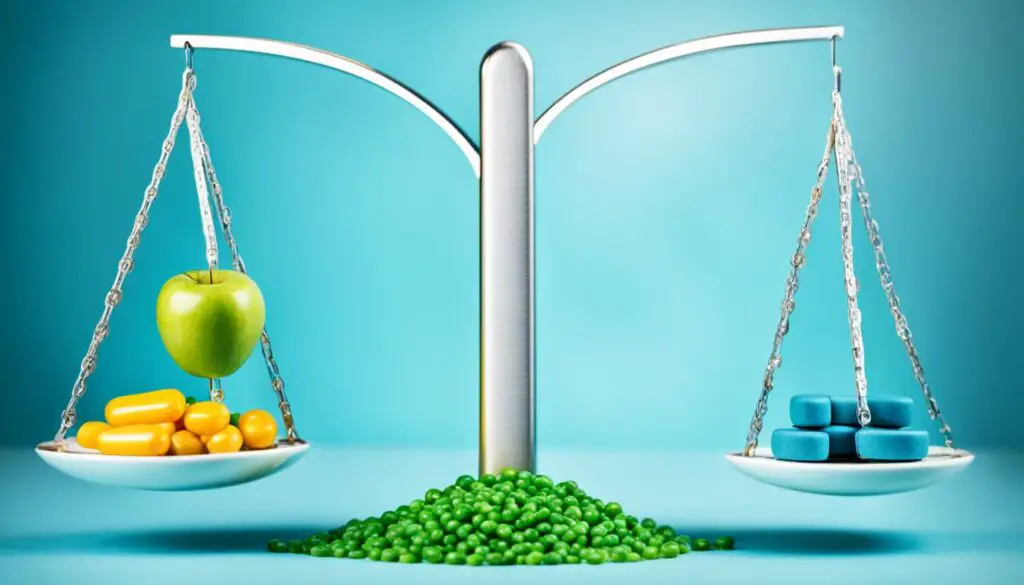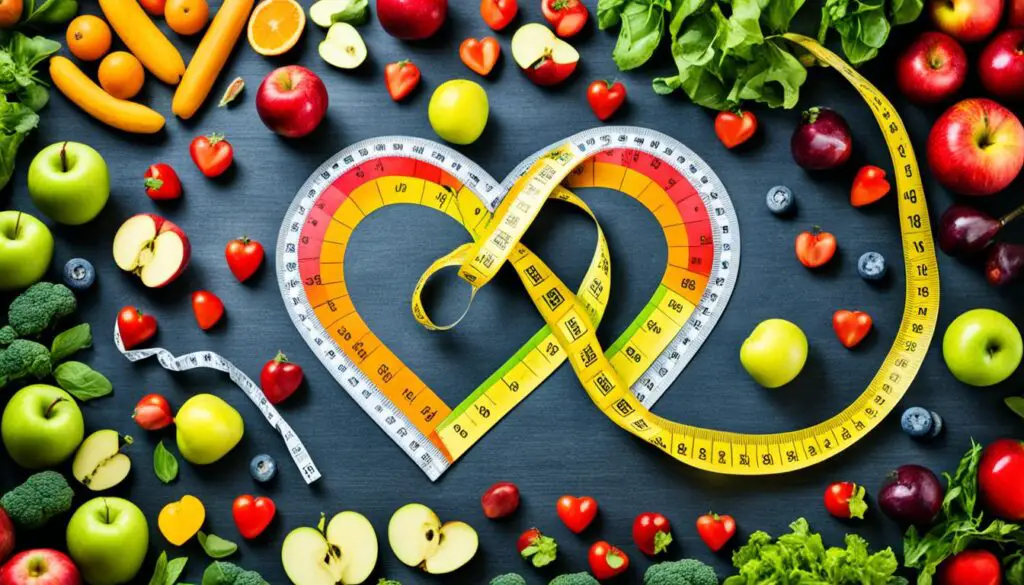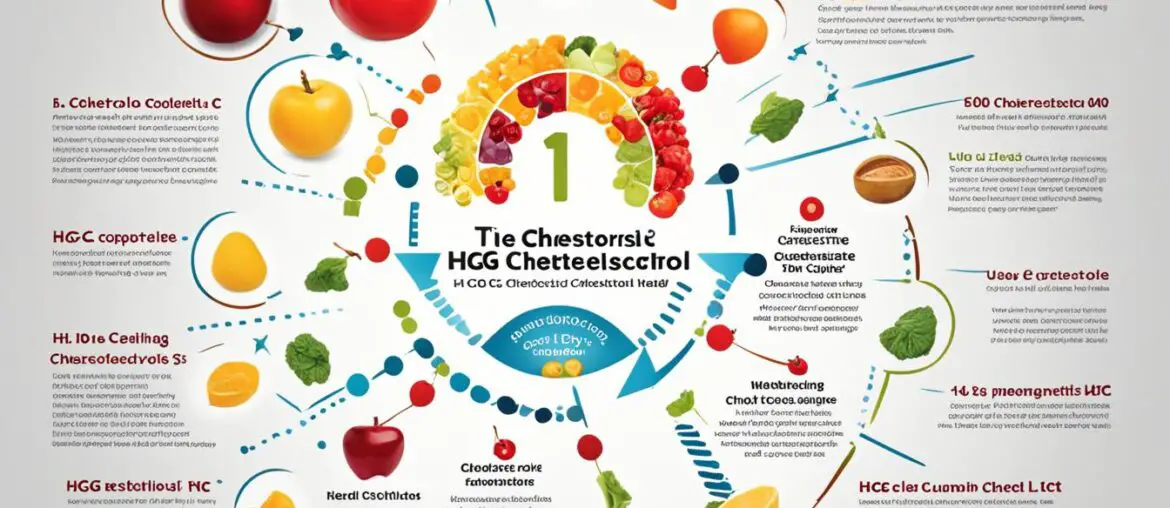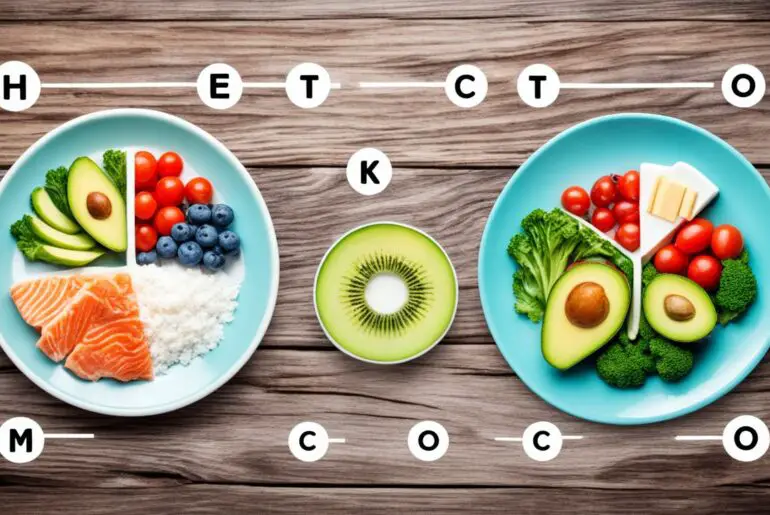Are you considering the HCG diet for weight loss? Think twice before you jump on this controversial trend. While the HCG diet promises rapid weight loss, its impact on cholesterol levels remains uncertain. In this article, we delve into the connection between the HCG diet and cholesterol levels to uncover the truth.
Key Takeaways:
- Despite its popularity, the HCG diet lacks scientific evidence and has potential health complications.
- High cholesterol levels increase the risk of cardiovascular diseases like heart attack and stroke.
- Losing weight can positively influence cholesterol levels, but the long-term effects of the HCG diet are unknown.
- A balanced diet, regular exercise, and cholesterol-lowering foods are vital for managing cholesterol levels and promoting heart health.
- Consulting with healthcare professionals before starting any weight loss program is crucial for personalized advice and cholesterol monitoring.
Understanding Cholesterol and its Impact on Health
Cholesterol is a crucial component of our overall health and plays a significant role in cardiovascular health. It is a waxy substance found in the blood and is essential for the production of hormones, vitamin D, and bile acids. However, maintaining healthy cholesterol levels is key to preventing cardiovascular diseases and promoting optimum well-being.
When discussing cholesterol, it is important to differentiate between low-density lipoprotein (LDL) cholesterol and high-density lipoprotein (HDL) cholesterol. LDL cholesterol is often referred to as “bad cholesterol” as it can contribute to the buildup of plaque in the arteries, leading to an increased risk of heart attack and stroke.
On the other hand, HDL cholesterol is known as “good cholesterol” because it aids in the removal of excess cholesterol from the bloodstream, reducing the risk of cardiovascular diseases. In other words, HDL cholesterol acts as a cleanser, helping to maintain a healthy cardiovascular system.
To achieve and maintain healthy cholesterol levels, it is crucial to focus on cholesterol management. This entails keeping LDL cholesterol levels in check while promoting the production and function of HDL cholesterol. By doing so, we can reduce the risk of heart disease and maintain optimum cardiovascular health.
Implementing a balanced diet that includes cholesterol-lowering foods such as fruits, vegetables, whole grains, and lean proteins can contribute to healthy cholesterol levels. Regular exercise and an active lifestyle also play a crucial role in maintaining optimum cholesterol levels. By incorporating these lifestyle choices, we can take control of our cholesterol and support our overall cardiovascular health.
Foods That Help Manage Cholesterol Levels
| Food Category | Examples |
|---|---|
| Fruits & Vegetables | Apples, oranges, spinach, broccoli |
| Whole Grains | Oats, quinoa, brown rice |
| Lean Proteins | Chicken breast, turkey, fish |
| Nuts & Seeds | Almonds, walnuts, flaxseeds |
| Healthy Fats | Avocado, olive oil, salmon |
“Maintaining healthy cholesterol levels is crucial for promoting cardiovascular health and preventing heart disease. By understanding the impact of cholesterol and making informed choices regarding our diet and lifestyle, we can take steps towards achieving optimal well-being.” – [Author Name]
The Link Between Weight Loss and Cholesterol Levels

Losing weight can have a significant impact on cholesterol levels and promote overall heart health. Numerous studies have shown that weight loss, particularly from abdominal fat, can lead to a decrease in LDL (low-density lipoprotein) cholesterol levels and an increase in HDL (high-density lipoprotein) cholesterol levels. This positive effect on cholesterol levels is attributed to the reduction of excess weight and body fat.
Weight loss not only helps in managing cholesterol but also offers a range of other benefits for cardiovascular health. It has been associated with improvements in blood pressure, blood sugar levels, and insulin sensitivity. These factors play a vital role in reducing the risk of heart diseases and promoting overall well-being.
To achieve lasting weight loss and maintain optimal cholesterol levels, it is crucial to adopt a healthy lifestyle. This includes incorporating regular exercise into your routine and following a balanced diet. Engaging in physical activity helps burn calories, increases muscle mass, and improves cardiovascular health. A balanced diet that is low in saturated and trans fats, high in fiber, and includes plenty of fruits, vegetables, whole grains, and lean proteins can contribute to cholesterol management.
“Weight loss can have a profound impact on cholesterol levels and cardiovascular health. By shedding excess weight and adopting a healthy lifestyle, individuals can experience significant improvements in cholesterol profiles and reduce their risk of heart disease.”
Remember, weight loss and cholesterol management are long-term commitments that require dedication and consistency. It is always recommended to consult with healthcare professionals before starting any weight loss program or making significant dietary changes. They can provide personalized recommendations, monitor cholesterol levels, and guide you on safe and effective strategies to achieve your health goals.
The Risks and Side Effects of the HCG Diet
The HCG diet poses several risks and potential side effects that individuals should be aware of before considering this weight loss method. One of the main risks associated with the HCG diet is ovarian hyperstimulation, which can occur when women use HCG injections for weight loss. Ovarian hyperstimulation is a condition in which the ovaries become swollen and painful, potentially leading to complications.
Furthermore, there have been reports of individuals experiencing serious health problems, including strokes, while following the HCG diet. These major health problems highlight the potential dangers associated with this diet plan. It is crucial to recognize that the long-term effects of the HCG diet on overall health and cholesterol levels are still unknown. Medical professionals do not approve the use of HCG for weight loss and strongly discourage its use.
Considering the potential risks and side effects, it is essential to prioritize safety when choosing a weight loss method. Consulting with healthcare professionals and opting for evidence-based, scientifically supported approaches to weight loss is crucial for minimizing potential harm and achieving sustainable results.
Experts’ Warnings
“The HCG diet is not supported by scientific evidence and can be dangerous to your health. There is no magic pill or injection for weight loss. It is essential to focus on sustainable lifestyle changes, such as a balanced diet and regular exercise, for long-term weight management.” – Dr. Emma Johnson, MD
The Potential Side Effects of the HCG Diet
| Side Effects | Description |
|---|---|
| Ovarian Hyperstimulation | A condition in which the ovaries become swollen and painful, potentially leading to complications. |
| Stroke | Reports of individuals experiencing strokes while following the HCG diet. |
| Major Health Problems | Other serious health problems have been associated with the HCG diet. |
It is important to prioritize your health and well-being when considering weight loss methods. Always consult with healthcare professionals before embarking on any diet or weight loss plan to ensure that it is safe and suitable for you.
The Role of HCG in Weight Loss

HCG, or human chorionic gonadotropin, is a hormone naturally produced during pregnancy. It serves a vital role in providing a constant supply of nutrients to the developing fetus by helping the body access and burn stored fat. The HCG diet aims to mimic this process through the use of HCG injections and a very low-calorie diet.
The proponents of the HCG diet claim that the hormone can increase metabolism and promote fat burning. They believe that HCG injections, combined with calorie restriction, can lead to significant weight loss. However, it is important to note that there is limited scientific evidence to support these claims.
While some studies have shown positive effects of HCG on weight loss, others have found no significant difference compared to a placebo. Additionally, the long-term effects of using HCG injections for weight loss and its impact on metabolism are not well understood.
Calorie Restriction and Potential Metabolic Effects
The calorie restriction component of the HCG diet is believed to contribute to weight loss. By severely limiting caloric intake, the body is forced to utilize stored fat for energy. However, it is essential to recognize that such restrictive diets can also have negative consequences, including nutrient deficiencies, muscle loss, and a slowed metabolism.
It is important to consult with healthcare professionals before embarking on any low-calorie diets or undergoing HCG injections for weight loss. They can provide personalized advice and ensure that your overall health is not compromised.
The Need for Further Research
Given the controversial nature of the HCG diet and the limited scientific evidence, more research is needed to evaluate its effectiveness and safety. Larger, well-designed studies are required to provide more conclusive insights into the role of HCG in weight loss and metabolic changes.
| Pros and Cons of the HCG Diet | |
|---|---|
| Pros | Cons |
|
|
Until more research is conducted, it is advisable to approach the HCG diet with caution and consider alternative weight loss methods that are supported by scientific evidence and do not pose potential risks to overall health.
Other Factors Influencing Cholesterol Levels
While weight loss can have a positive impact on cholesterol levels, there are other important factors to consider when managing your cholesterol. Alongside diet and exercise, genetics, age, and various lifestyle factors can influence your cholesterol levels and overall heart health.
Importance of Diet
Diet plays a significant role in cholesterol management. A low cholesterol diet that includes plenty of fruits, vegetables, whole grains, and lean proteins can help maintain healthy cholesterol levels. These foods are rich in nutrients, fiber, and antioxidants that support heart health and help control cholesterol levels.
For example, incorporating high-fiber foods like oatmeal, beans, and apples can help lower cholesterol levels by reducing the absorption of cholesterol in the intestines. Consuming omega-3 fatty acids from sources like fatty fish, flaxseeds, and walnuts can also have a positive impact on cholesterol levels.
Avoiding foods high in saturated fats and trans fats, such as fatty meats, fried foods, and commercially baked goods, can help prevent the buildup of LDL cholesterol in the arteries.
Here is a table summarizing some cholesterol-lowering foods:
| Foods | Cholesterol-Lowering Benefits |
|---|---|
| Fruits and Vegetables | Rich in fiber and antioxidants that support heart health and reduce LDL cholesterol levels. |
| Whole Grains | Provide fiber and nutrients that help lower LDL cholesterol and reduce the risk of heart disease. |
| Lean Proteins | Such as skinless poultry, fish, and legumes, contain less saturated fat and can help maintain healthy cholesterol levels. |
Role of Exercise
Regular exercise is another crucial factor in cholesterol management. Engaging in physical activity can help raise HDL cholesterol levels (the “good” cholesterol) while lowering LDL cholesterol levels (the “bad” cholesterol). It can also help improve blood flow, reduce inflammation, and promote overall heart health.
Combining aerobic exercises like brisk walking, jogging, or cycling with strength training exercises can have a significant impact on cholesterol levels. Aim for at least 150 minutes of moderate-intensity aerobic activity or 75 minutes of vigorous activity per week, along with strength training exercises at least twice a week.
Considering Genetic Factors
Genetics can play a role in cholesterol levels. Some individuals may inherit genes that influence their cholesterol metabolism, making it more challenging to maintain healthy levels solely through diet and exercise. It is essential to be aware of your family history and discuss any concerns with your healthcare provider.
Age and Cholesterol
Age is another factor to consider when managing cholesterol levels. As you get older, your cholesterol levels can naturally increase. This is why regular check-ups and cholesterol screenings are crucial, especially for individuals over the age of 40.
Other Lifestyle Factors
In addition to diet, exercise, genetics, and age, other lifestyle factors can impact your cholesterol levels. These include:
- Avoiding tobacco use: Smoking damages blood vessels, lowers HDL cholesterol, and increases the risk of heart disease.
- Achieving and maintaining a healthy weight: Excess weight, especially around the waist, can contribute to higher cholesterol levels.
- Managing stress: Chronic stress can affect cholesterol levels and overall heart health. Adopt stress management techniques such as exercise, meditation, or hobbies.
- Limiting alcohol consumption: Excessive alcohol intake can raise cholesterol levels and increase the risk of heart disease. Moderation is key.
By considering these factors and making positive changes to your diet, exercise routine, and lifestyle choices, you can effectively manage your cholesterol levels and maintain optimal heart health.
The Importance of Cholesterol Management for Heart Health
Managing cholesterol levels is crucial for maintaining heart health and preventing cardiovascular diseases. High levels of LDL cholesterol can lead to the buildup of plaque in the arteries, increasing the risk of heart attack and stroke. On the other hand, adequate levels of HDL cholesterol can help remove excess cholesterol from the bloodstream and protect against heart disease.
Incorporating cholesterol-lowering foods into your diet can aid in cholesterol management. Fruits, vegetables, whole grains, and lean proteins are excellent choices for maintaining heart health. These foods are rich in nutrients, fiber, and antioxidants, which can help lower LDL cholesterol levels and support overall heart health.
| Cholesterol-Lowering Foods | Benefits |
|---|---|
| Fruits and vegetables | High in fiber and antioxidants to help reduce LDL cholesterol levels. |
| Whole grains | Contain soluble fiber that can lower LDL cholesterol levels. |
| Legumes | Rich in soluble fiber and plant-based proteins that can lower LDL cholesterol. |
| Fatty fish | Provide omega-3 fatty acids that can help lower triglyceride levels and reduce the risk of heart disease. |
| Nuts | Contain healthy fats, fiber, and antioxidants that can improve cholesterol levels and reduce inflammation. |
| Olive oil | Rich in monounsaturated fats that can help raise HDL cholesterol levels and lower LDL cholesterol levels. |
By incorporating these cholesterol-lowering foods into your diet and making other healthy lifestyle choices, you can effectively manage your cholesterol levels and support long-term heart health. Regular exercise, maintaining a healthy weight, and avoiding tobacco use are also important factors in cholesterol management and overall heart health.
The Importance of a Balanced Diet and Regular Exercise

A balanced diet and regular exercise are key components of a healthy lifestyle that contribute to weight management and cholesterol control. By adopting these practices, you can improve your overall health and well-being.
A balanced diet plays a crucial role in maintaining optimal cholesterol levels. Include a variety of fruits, vegetables, whole grains, lean proteins, and healthy fats in your daily meals. These nutrient-rich foods provide essential vitamins, minerals, and antioxidants that support heart health and help manage cholesterol levels.
Regular exercise is equally important. Engaging in physical activity helps manage weight, improves cardiovascular health, and increases levels of high-density lipoprotein (HDL) cholesterol, often referred to as “good cholesterol.” This type of cholesterol helps remove excess cholesterol from the bloodstream, reducing the risk of heart disease.
When it comes to weight management, a balanced diet and regular exercise work hand in hand. A calorie-controlled diet combined with physical activity helps create an energy deficit, leading to weight loss. This weight loss can have a positive impact on cholesterol levels, particularly by reducing levels of low-density lipoprotein (LDL) cholesterol, often referred to as “bad cholesterol.”
By adopting a healthy lifestyle that includes a balanced diet and regular exercise, you can improve your cholesterol management, maintain a healthy weight, and reduce the risk of cardiovascular diseases. Remember, small changes in your habits can have a significant impact on your overall health and well-being.
Consultation with Healthcare Professionals

When considering weight loss programs or making significant dietary changes, it is always advisable to consult with healthcare professionals. Their expertise and medical advice can play a crucial role in guiding you towards safe and effective strategies that align with your overall health goals. Healthcare professionals can provide personalized recommendations based on your individual health needs, monitor cholesterol levels, and recommend appropriate interventions.
By consulting with healthcare professionals, you can gain valuable insights into the best weight loss programs and cholesterol monitoring techniques for your specific situation. They can help you navigate through the vast amount of information available, debunking myths and providing evidence-based recommendations.
Medical professionals also have access to advanced diagnostic tools and expertise in interpreting cholesterol levels. This means they can provide accurate assessments of your current cholesterol status and guide you in managing and monitoring your cholesterol levels effectively.
Consulting with healthcare professionals is crucial in ensuring that your weight loss journey and cholesterol management are approached in a safe and informed manner.
Moreover, healthcare professionals can offer valuable guidance on lifestyle modifications, such as diet and exercise, that can support your weight loss efforts and contribute to maintaining healthy cholesterol levels in the long term. Their comprehensive approach to healthcare considers not just weight loss, but also your overall well-being, addressing any underlying health issues that may impact your cholesterol management.
Remember, the expertise and guidance of healthcare professionals are invaluable resources when embarking on a weight loss journey and ensuring the optimal management of your cholesterol levels. By working together with these professionals, you can make informed decisions that are tailored to your specific needs, promoting your overall health and well-being.
Benefits of Consultation with Healthcare Professionals:
- Personalized advice based on your specific health needs
- Accurate assessment and monitoring of cholesterol levels
- Guidance on safe and effective weight loss strategies
- Diet and exercise recommendations for cholesterol control
- Evidence-based medical advice and interventions
Consult with healthcare professionals for their expertise and medical advice. They can provide personalized recommendations, monitor cholesterol levels, and guide you towards safe and effective weight loss programs. They are instrumental in ensuring that your weight loss journey and cholesterol management are approached in a safe and informed manner.
Maintaining Long-Term Heart Health

Maintaining long-term heart health requires a commitment to making healthy lifestyle choices. By incorporating a balanced diet, regular physical activity, weight management, tobacco avoidance, and regularly monitoring cholesterol levels, you can significantly reduce the risk of cardiovascular diseases and ensure optimal heart health.
Adopting a balanced diet is crucial in maintaining long-term heart health. Consuming a variety of fruits, vegetables, whole grains, lean proteins, and healthy fats provides essential nutrients and supports overall cardiovascular well-being. Additionally, limiting the intake of saturated and trans fats, cholesterol, sodium, and added sugars is key in promoting a heart-healthy diet.
Incorporating regular physical activity into your routine plays a vital role in heart health. Engaging in aerobic exercises such as brisk walking, running, cycling, swimming, or dancing for at least 150 minutes per week helps improve cardiovascular endurance and reduces the risk of heart diseases. It is important to choose activities that you enjoy and gradually increase the intensity and duration over time.
Managing weight is essential for heart health, as excess weight can contribute to high cholesterol levels and increase the risk of cardiovascular diseases. By maintaining a healthy weight through a combination of a balanced diet and regular exercise, you can reduce strain on the heart and improve overall cardiovascular function.
Avoiding tobacco use is crucial in maintaining long-term heart health. Smoking and exposure to secondhand smoke can damage the arteries, increase blood pressure, reduce oxygen levels, and promote the development of heart disease. Quitting smoking and avoiding exposure to tobacco smoke significantly improves heart health.
Regularly monitoring cholesterol levels is necessary to assess and maintain optimal heart health. High levels of LDL cholesterol can lead to the accumulation of plaque in the arteries, increasing the risk of heart attacks and strokes. By monitoring cholesterol levels through regular blood tests and working with healthcare professionals, you can take appropriate steps to manage cholesterol and reduce the risk of cardiovascular diseases.
Tips for Long-Term Heart Health
| Healthy Lifestyle Choices | Impact on Heart Health |
|---|---|
| Eating a balanced diet | Supports heart health by providing essential nutrients and reducing the risk of cardiovascular diseases. |
| Engaging in regular physical activity | Improves cardiovascular endurance, reduces the risk of heart diseases, and promotes overall heart health. |
| Managing weight | Reduces strain on the heart, lowers cholesterol levels, and decreases the risk of heart diseases. |
| Avoiding tobacco use | Significantly improves heart health by reducing the risk of heart diseases caused by smoking. |
| Regularly monitoring cholesterol levels | Enables the assessment and management of cholesterol to reduce the risk of cardiovascular diseases. |
By actively implementing these healthy lifestyle choices, you can maintain long-term heart health, prevent cardiovascular diseases, and ensure optimal cholesterol maintenance. Consistency and commitment to these lifestyle changes will have a positive impact on your overall well-being and quality of life.
Conclusion
The HCG diet, a controversial weight loss trend, lacks scientific evidence to support its effectiveness and safety. While it may lead to weight loss, its impact on cholesterol levels is unclear. On the other hand, maintaining optimal cholesterol levels and promoting heart health can be achieved through a balanced diet, regular exercise, and other healthy lifestyle choices.
It is important to prioritize a holistic approach to weight loss and cholesterol management, consulting with healthcare professionals before making any significant changes to diet or embarking on weight loss programs. These experts can provide personalized advice, monitor cholesterol levels, and recommend safe and effective strategies to achieve weight loss goals.
By adopting a balanced diet that includes fruits, vegetables, whole grains, and lean proteins, incorporating regular physical activity into daily routines, and avoiding tobacco use, individuals can take control of their cholesterol levels and promote overall heart health. Remember, maintaining long-term heart health requires a commitment to healthy lifestyle choices, ensuring an ongoing focus on balanced eating and regular physical activity.
FAQ
What is the HCG diet and how does it affect cholesterol levels?
The HCG diet is a controversial weight loss trend that involves injecting oneself with a hormone derived from pregnant women. While weight loss can have a positive impact on cholesterol levels, the specific effect of the HCG diet on cholesterol is unclear, and health experts strongly recommend against it due to potential risks and lack of scientific evidence.
What is cholesterol and how does it impact health?
Cholesterol is a waxy substance found in the blood that plays important roles in hormone production, vitamin D synthesis, and bile acid production. However, high levels of cholesterol, especially LDL cholesterol, can increase the risk of cardiovascular diseases like heart attack and stroke. Balancing cholesterol levels is crucial for maintaining optimal cardiovascular health.
Does weight loss have an effect on cholesterol levels?
Yes, weight loss can have a positive impact on cholesterol levels. Studies have shown that losing weight, especially from abdominal fat, can lead to a decrease in LDL cholesterol levels and an increase in HDL cholesterol levels. Weight loss has also been associated with improvements in other cardiovascular risk factors.
What are the risks and side effects of the HCG diet?
The HCG diet poses several risks and potential side effects. One of the main risks is ovarian hyperstimulation, particularly in women using HCG for weight loss. There have been reports of women experiencing strokes and other major health problems while using HCG. The long-term effects of the HCG diet on overall health and cholesterol levels are unknown.
How does HCG contribute to weight loss?
HCG is a hormone naturally produced during pregnancy and is believed to help the body access and burn stored fat. The HCG diet aims to mimic this process by using HCG injections and a very low-calorie diet. However, there is limited scientific evidence to support the claims that HCG can increase metabolism and promote fat burning.
Apart from weight loss, what other factors can influence cholesterol levels?
Diet plays a significant role in cholesterol management, and adopting a low cholesterol diet that includes fruits, vegetables, whole grains, and lean proteins can help maintain healthy cholesterol levels. Regular exercise, maintaining a healthy weight, and avoiding tobacco use are also important factors in cholesterol control. Additionally, genetic factors, age, and underlying health conditions can affect cholesterol levels.
Why is cholesterol management important for heart health?
Managing cholesterol levels is crucial for maintaining heart health and preventing cardiovascular diseases. High levels of LDL cholesterol can lead to the buildup of plaque in the arteries, increasing the risk of heart attack and stroke. Adequate levels of HDL cholesterol help remove excess cholesterol from the bloodstream and protect against heart disease.
How important are a balanced diet and regular exercise for cholesterol management?
A balanced diet that includes fruits, vegetables, whole grains, lean proteins, and healthy fats, combined with regular exercise, is essential for cholesterol management. Such a lifestyle can help maintain optimal cholesterol levels, manage weight, improve cardiovascular health, and increase HDL cholesterol levels.
Should I consult with healthcare professionals before starting the HCG diet or making dietary changes?
Yes, it is always advisable to consult with healthcare professionals before starting any weight loss program or making significant dietary changes. They can provide personalized advice, monitor cholesterol levels, and recommend appropriate interventions based on individual health needs. Healthcare professionals can also guide on safe and effective weight loss strategies that align with overall health goals.
How can I maintain long-term heart health?
Maintaining long-term heart health requires an ongoing commitment to a healthy lifestyle. This includes adopting a balanced diet, engaging in regular physical activity, managing weight, avoiding tobacco use, and regularly monitoring cholesterol levels. making these lifestyle changes can help prevent cardiovascular diseases and maintain optimal cholesterol levels for overall heart health.
Can the HCG diet be considered as a safe and effective way to manage cholesterol levels?
No, the HCG diet is a controversial trend that lacks scientific evidence to support its effectiveness and safety. Health experts strongly recommend against it due to potential risks and side effects. A balanced diet, regular exercise, and other healthy lifestyle choices are recommended for managing cholesterol levels and promoting overall heart health.




